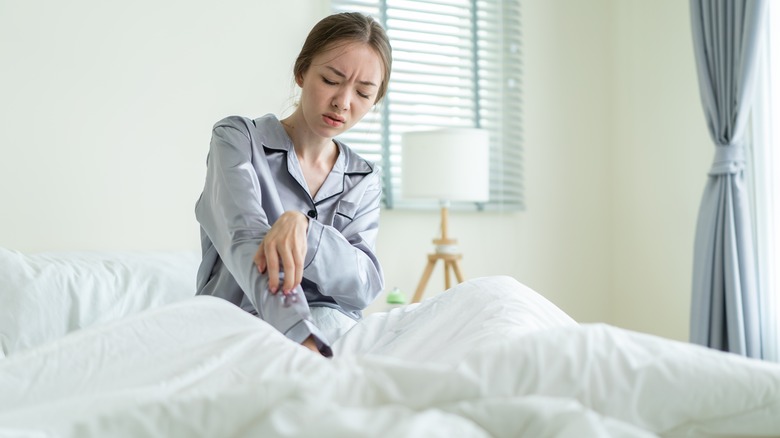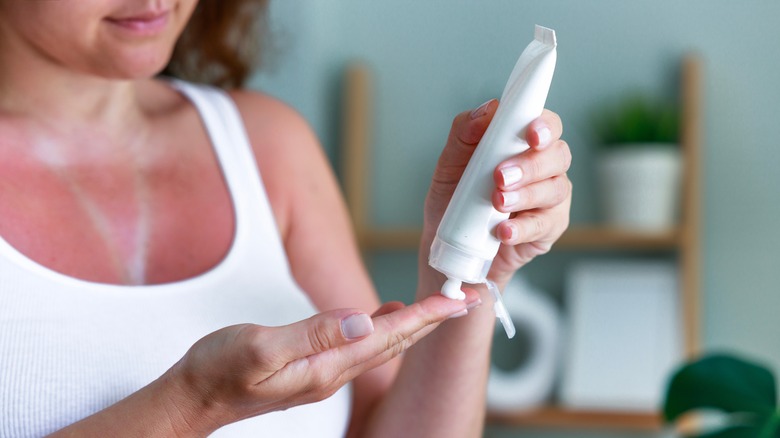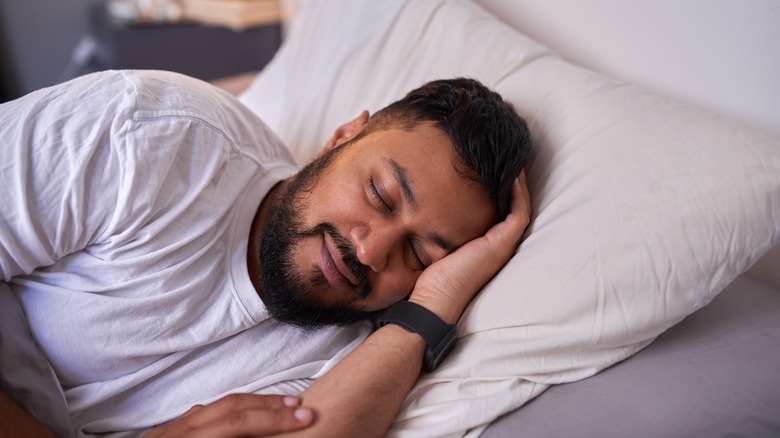Follow These Steps Before Bed To Successfully Sleep With A Sunburn
A nasty sunburn doesn't only make sleep challenging; it can make catching those Z's downright painful. With a little preparation, however, you can spend less time cautiously tossing and turning, and more time giving your body the rest it needs.
The pain of a sunburn feels nearly impossible to ignore once night rolls around. The Sleep Foundation states that this is because it takes at least 4 hours for symptoms of a sunburn to kick in, with pain reaching its peak around the 6-hour mark following UV ray damage. This explains why the aggravation of a sunburn can feel particularly pronounced at bedtime after a long day spent at the beach. If you're a back sleeper, this discomfort may be further compounded by added pressure on your sunburned back or by sticky sheets clinging to your sensitive skin.
While there's no overnight solution to sun-damaged skin, here are six easy steps you can take to make sleeping with a sunburn less miserable.
Shower, moisturize, and choose your PJs wisely
For starters, try taking a short, cool shower, which can lessen inflammation and potentially reduce sunburn pain, according to Dr. Cindy Kermott from Mayo Clinic. If baths are more your style, experts at Long Island Spine Specialists suggest mixing a cup or two of vinegar in your bath water. Although pungent, it's vinegar's acetic acid content that harbors pain-relief properties. Just remember to gently pat-dry your skin afterwards rather than rubbing the body dry with a rough towel.
Next, moisturizing skin can help relieve a painful sunburn. If your skin has started blistering, however, avoid topical products altogether, cautions the Sleep Foundation — and hold off on any harsh exfoliating. Lotions containing vitamin C and E or aloe vera gel tend to be your best bet. Whatever you do, experts say to steer clear of petroleum jelly, oil-based products, body butter, creams containing lidocaine or benzocaine, and any skin care products with fragrance ingredients, all of which can aggravate sunburned skin. Finally, lightly bandage any blisters before retiring to the bedroom.
The third step is to choose your most sunburn-friendly pajamas. Dermatologist Dr. Ted Lain told Refinery29 that cotton or silk nighttime wear reduces the risk of painful fabric-to-skin friction — that, or sleeping in your birthday suit. Similarly, you'll want to pick soft, clean sheets made out of these same lightweight materials.
Crank up the AC, drink water, and take an OTC pain-reliever
Finish priming your bedroom for optimal sleep by blasting the air-conditioning before turning out the lights. The fifth step is to make sure you're adequately hydrated prior to climbing into bed. While drinking water right before bed can be a recipe for frequent nighttime bathroom trips, you want to increase your water intake when healing from a sunburn, and this includes before falling asleep.
If sunburned skin is still giving you grief, the sixth and final step is to consider taking an over-the-counter (OTC) pain-relief medication, like ibuprofen or Tylenol, suggests the Sleep Foundation. Remember to follow all dosage instructions on the label or talk to your healthcare provider about how much is safe to take. In more severe cases, your doctor may issue prescription medication.
Seek medical care if sunburn is accompanied by additional symptoms, such as extreme pain, fever, nausea, a fast heart rate, extreme thirst, or if your sunburn covers a large percentage of the body. There are many precautions a person can take to protect themselves from UV ray skin damage. That being said, there's a chance you're not protecting yourself from the sun as well as you think, so click to learn more about some of the best ways to prevent sunburn and related health risks.



